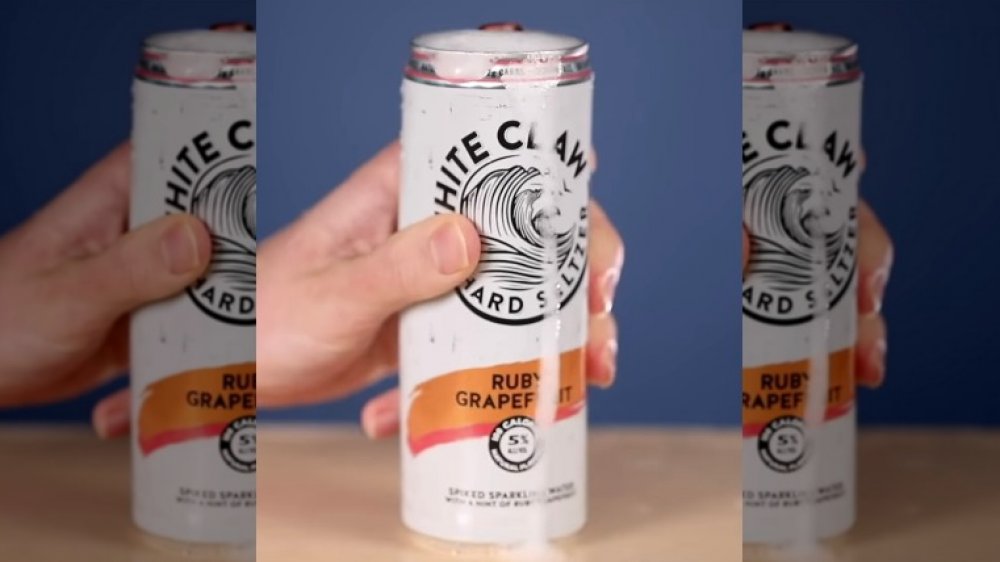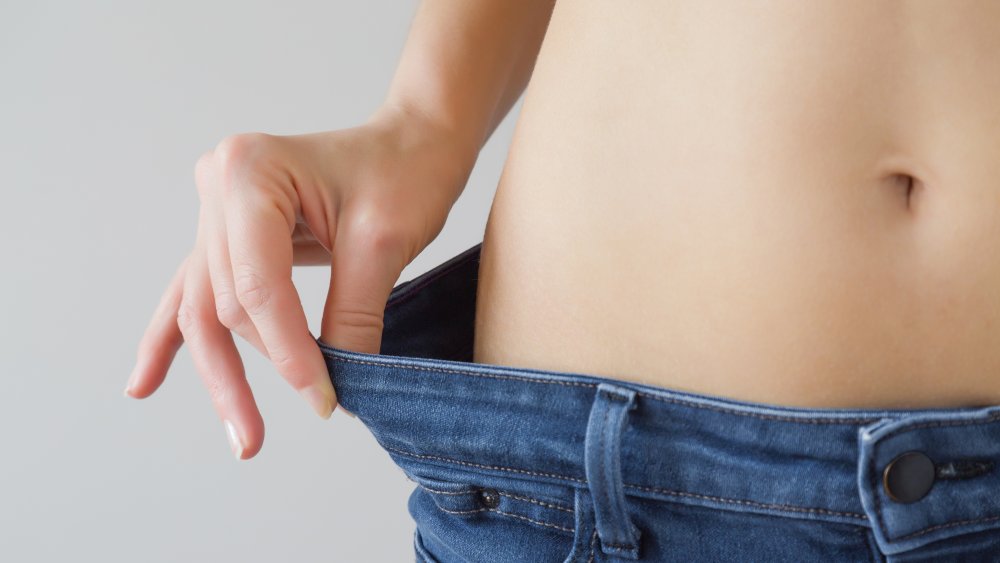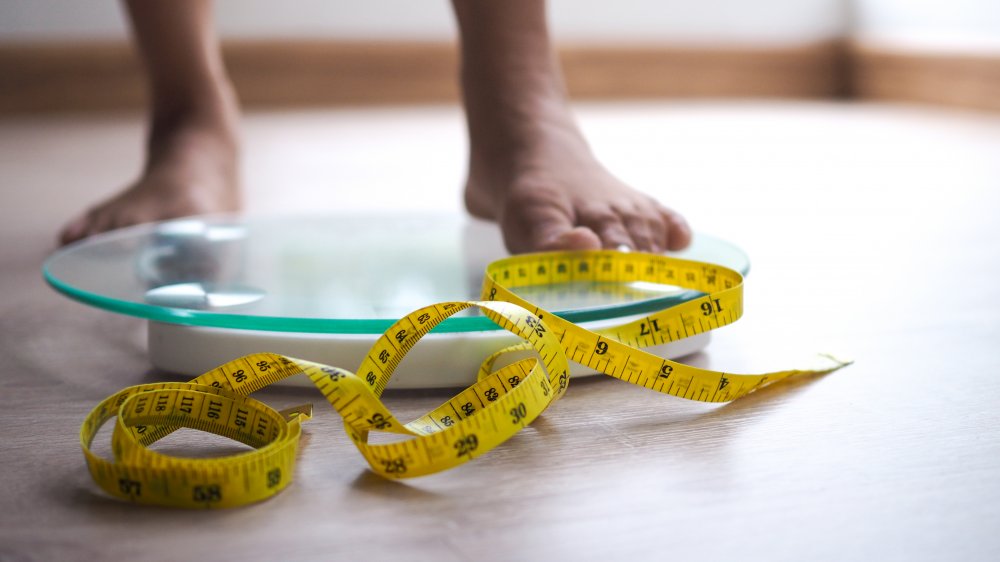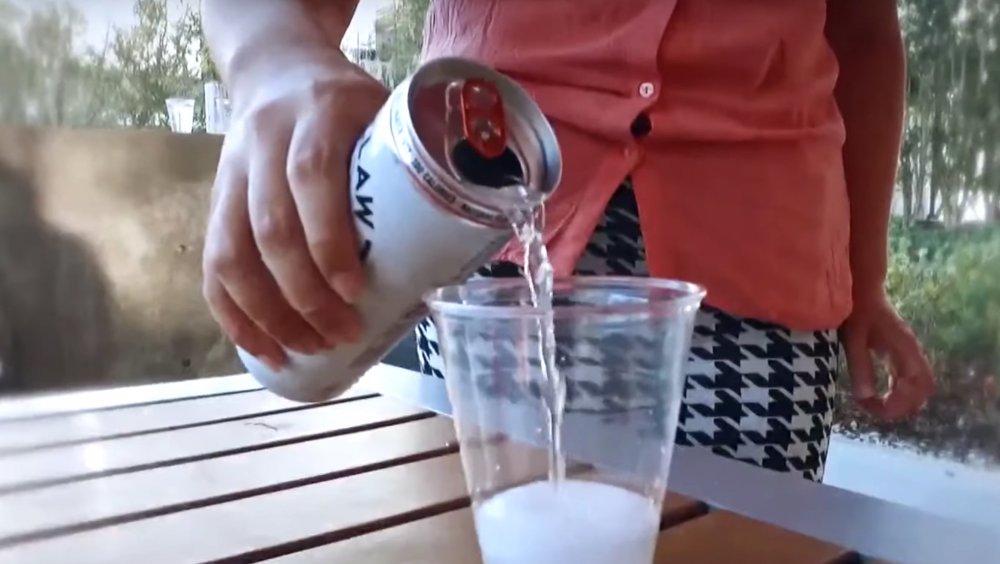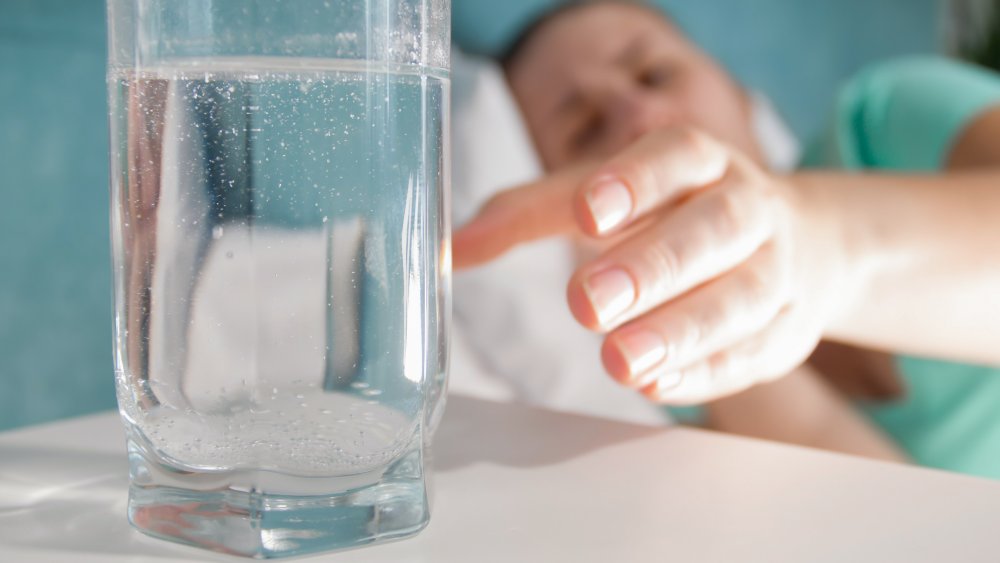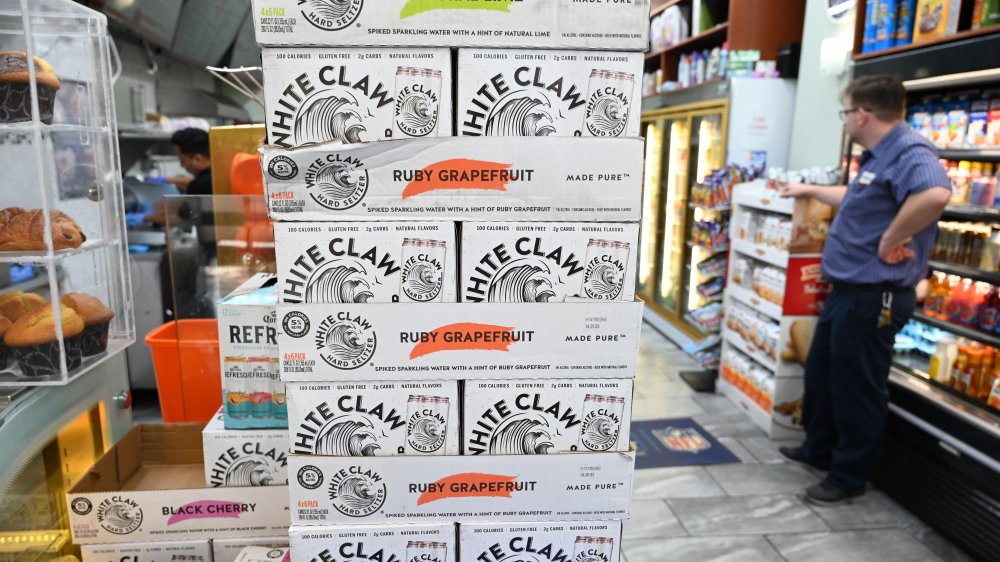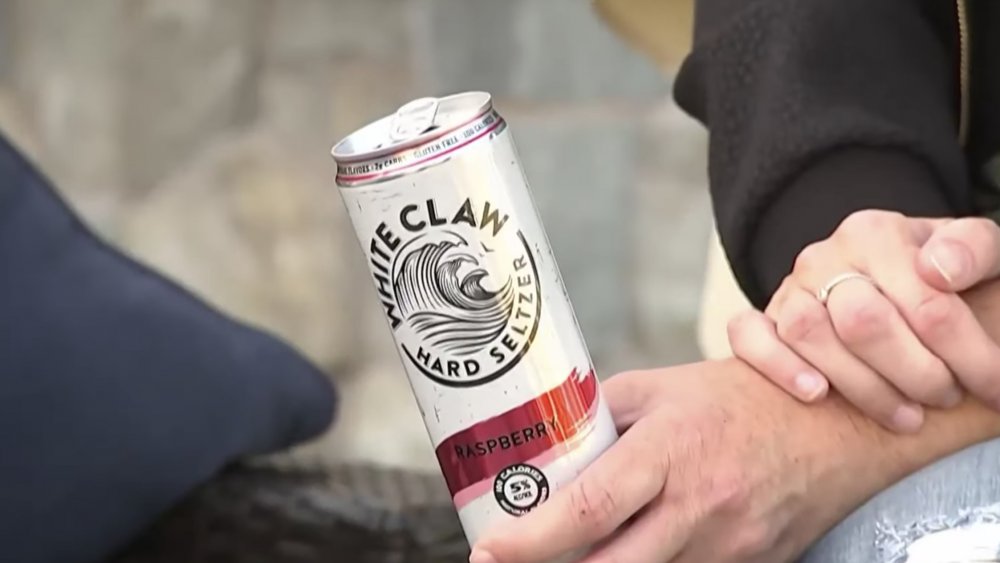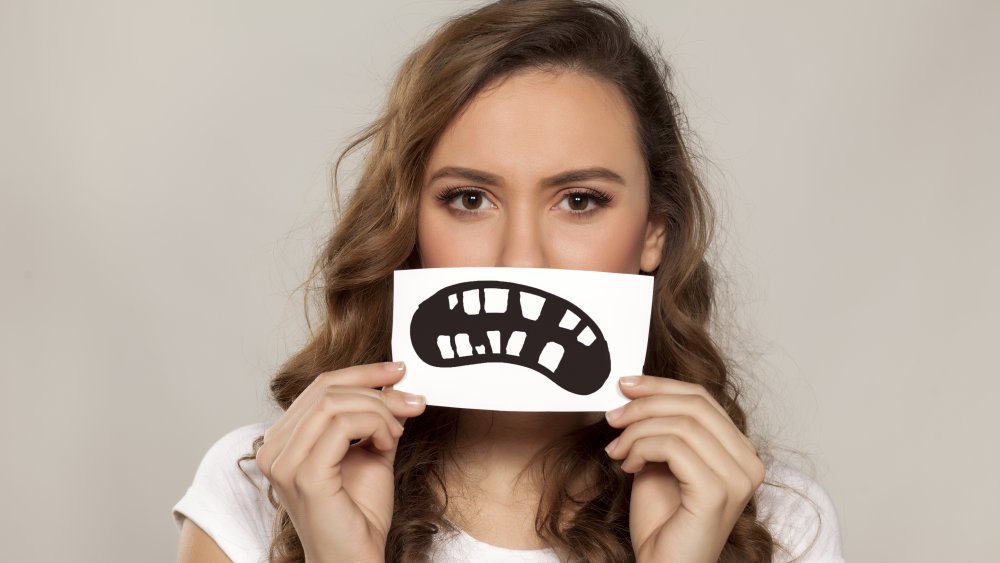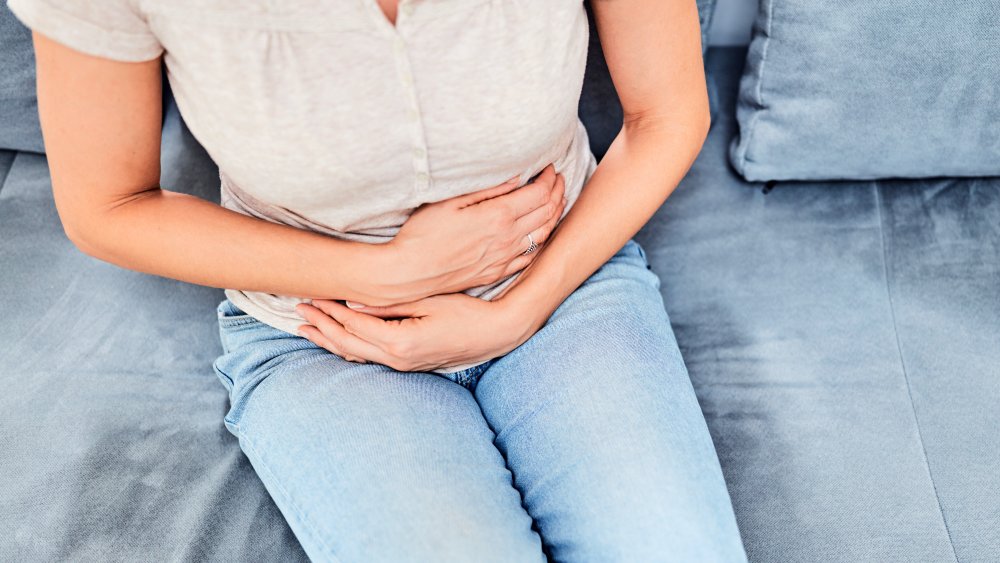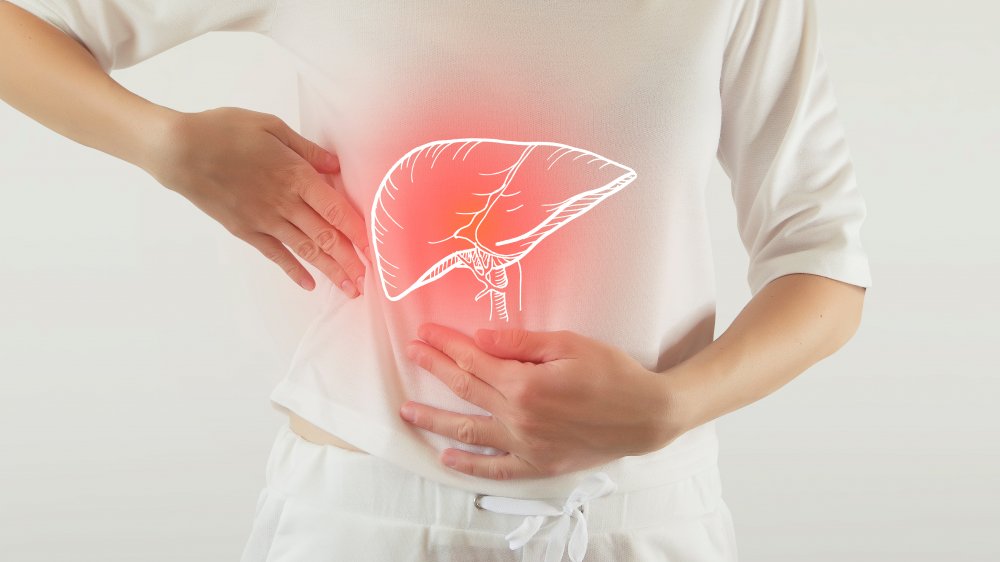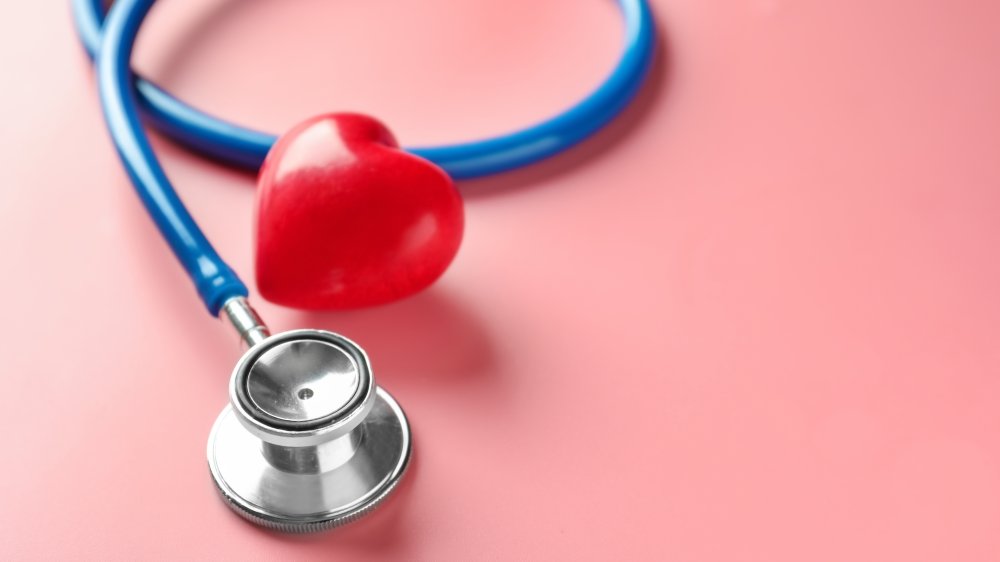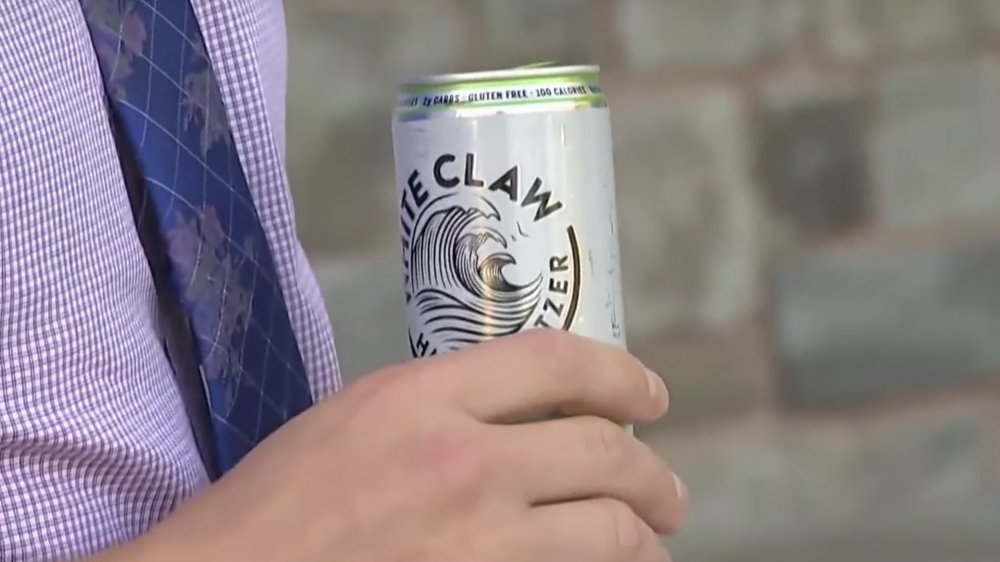When You Drink White Claw Every Night, This Is What Happens
If you bought a case of White Claw any time since the drink's introduction in 2016, you contributed to the brand's astronomical success. Launched by Mark Anthony Brewing as a low-calorie alcohol alternative, the hard seltzer hit its stride during 2019 when, according to Nielsen data, its sales increased by 193 percent from the year before.
Why the sudden spike in sales for spiked seltzer? Genevieve Aronson, a Nielsen spokeswoman, told The New York Times, "It captured the zeitgeist of American drinkers, as it sits at the nexus of health, wellness and convenience."
According to the brand's website, the cocktail, which has been considered one of the best spiked seltzer brands out there, is made using a blend of seltzer water, a gluten-free alcohol base, and fruit flavoring. A White Claw rep broke it down further for Vinepair, noting that the alcohol in its beverages "comes from fermented sugars derived from malted gluten-free grains." And weighing in at 100 calories with only two grams of carbs and a moderately strong five percent alcohol-by-volume content, health-conscious drinkers continually reach for these slim, 12-ounce cans. But what really happens to your body if you drink White Claw every night? Read on to find out.
If you drink White Claw every night instead of other alcoholic drinks, you could lose weight
While the National Institute of Health says alcoholic beverages "may contribute to unwanted weight gain," its online alcohol calorie calculator makes a case for White Claw consumption. In comparison to the spiked seltzer's 100 calories per serving, regular beer comes in around 150 calories per serving, while red wine measures up at about 125 calories per serving. A fruity piña colada is listed at a whopping 490 calories for one nine-ounce drink!
So while U.S. News & World Report says White Claw's low-calorie and gluten-free content does not equal a healthier drink, there will be a caloric savings if you drink the beverage instead of other alcoholic drinks. "People are going to feel a little better about consuming a hard seltzer versus a standard beer that's going to be higher in calories and carbs," Angel Planells, a registered dietitian and an Academy of Nutrition & Dietetics spokesperson, told GQ. And while Planells sticks with the Center for Disease Control guidelines — one drink a day for women, two for men — Planells said "those figures could be stretched" when drinking White Claw, as its reduced calorie count could allow for more drink consumption. So choosing to drink White Claw every night as opposed to other alcoholic drinks could prove beneficial — though, if you want to lose weight, cutting out all alcohol would probably be the way to go.
If you drink White Claw every night, you will be filling your body with empty calories
White Claw's low-carb, low-calorie makeup and light fruity flavor may have attracted many health-conscious drinkers, but Everyday Health calls those values a "health halo," stating that the drink is filled with empty calories that don't support your health.
"There are no real nutritional benefits from consumption of hard seltzer, as they are primarily just empty calories," Mia Syn, a registered dietitian nutritionist in Charleston, S.C., told the website. Placing the drink into a category of "fun foods," the nutritionist said consumption of the beverage is fine but should be kept "to a minimum" — drinking it daily will only fill your body with empty calories. "They provide energy, but no other nutrition like vitamins and minerals," she said.
Judging the drink only in terms of calories and carbs — or even by its lower alcohol content — can be misleading, the expert added, saying that many consumers see it as a "free pass." Syn said, "Someone could view this drink as healthy and 'diet-friendly,' which could lead to someone consuming more, increasing both the number of calories and quantity of alcohol." So, if you want to drink White Claw every night, just know that you're not doing your body any favors in terms of caloric intake.
You could stay in ketosis if you drink White Claw every night
Are you following a Keto diet? If so, making the decision to drink White Claw every night instead of other alcoholic drinks may be in your best interest. Experts say that drinking the clear bubbly concoction will actually help you stay in ketosis. Calling White Claw lighter than beer or mixed drinks with a high sugar content, Courtney Dunn, a registered dietitian in San Diego, told Refinery29 the drink "could definitely be a good substitute if you were trying to lose weight or stick within your macro goal."
Molly Knudsen, M.S., RDN, praised White Claw's keto benefits to Mind Body Green Health. "Typically, most people following a keto diet keep their carb intake at 50 grams or less a day. So sparing two of those grams for a White Claw every now and then is totally feasible," she said. Defining mixed drinks as keto killers, Knudsen says the low carb value of White Claw is actually a perfect fit for keto dieters. She explained, "Any drink with fruit juice, sweetened sodas, or simple syrups are going to be loaded with carbs and could knock you out of ketosis in a snap."
If you drink White Claw every night, it could cause dehydration
Billed as light and refreshing because of its seltzer base and available in a wide range of flavors like mango, ruby red grapefruit, and black cherry, White Claw is often pooled into a category of hydrating drinks. But registered dietitian at the Cleveland Clinic Wellness and Preventive Medicine Institute, Anna Kippen, MS, RDN, told the Food Network that even though you're technically drinking carbonated water, you are actually experiencing dehydration if you drink White Claw every night because it includes alcohol, which in and of itself is a diuretic.
"It's easy to mistake a clear, sparkling drink that isn't too sweet for being hydrating, but let's not forget that we are drinking alcohol," Kippen said. In order to combat this effect, Kippen suggested staying hydrated, reaching for a nonalcoholic seltzer or water between drinks. So, if you're planning to enjoy a couple of drinks, maybe grab a glass of water each time you snatch a White Claw from the fridge.
If you drink White Claw every night, you could potentially find yourself addicted to it
If you drink White Claw every night, can you become addicted? Some experts say yes. When a White Claw shortage was widely reported in 2019, causing panic among consumers as the manufacturer worked overtime to keep up with demand, White Claw's senior vice president of marketing Sanjiv Gajiwala told Agence France-Presse that the surging popularity of the drink was born out of millennials wanting more. "Millennials are consumers that grew up on 10 different flavors of Gatorade and cuisines from around the world. When they come to the legal drinking age, they are looking for more," Gajiwala stated.
But others worried about the beverage's potential for alcohol addiction, voicing concerns about the body becoming addicted to the drink if it is consumed every day. "The alcohol is the drug. Everything else is just the way it's delivered," Aaron White of the National Institute on Alcohol Abuse and Alcoholism told AFP.
Happy that consumers were counting calories, White still worried that people may be inadvertently consuming more alcohol when drinking White Claw because "fruity seltzers don't taste like traditional booze."
If you drink White Claw every night, you could avoid a hangover
Beer before liquor, never been sicker; liquor before beer, you're in the clear. Is there room for White Claw in that old adage? Dr. Niket Sonpal, a gastroenterologist and member of Touro College of Medicine's faculty, told Bustle the clear beverage holds its own special place in the hangover realm. According to Sonpal, White Claw does not contain congeners, "a byproduct of the fermentation process ... Found in dark liquors, dark beers and red wine" that "have long been thought to increase the intensity of a hangover."
So if you drink White Claw every night, "the hangover ... could be less intense for some people," Sonpal said, "especially if they don't generally experience stomachaches." Sonpal also pointed to White Claw's alcohol by volume (ABV) — five percent — which he said is less than half of wine's ABV — 10 to 15 percent. He noted that if "you drink the same amount of wine as you would hard seltzer," the hangover would be notably more severe. And if you're sensitive to gluten, Sonpal said you may also feel better the day after drinking gluten-free White Claw.
If you drink White Claw every night, your teeth could rot
According to a study published in the International Journal of Paediatric Dentistry in 2007, high pH levels found in sparkling water gives the bubbly drink greater erosive potential than orange juice. So what happens when that sparkling water is spiked? Orthodontist Heather Kunen, DDS, MS, told Real Simple that White Claw "creates a more acidic oral environment and makes enamel more vulnerable to wear and attack by bacteria."
Kunen went on, "When it comes to the consumption of any alcoholic beverage, the biggest concerns I have as a dentist are related to the sugar content of the drink, as well as the dry-mouth side effect of the alcohol itself." White Claw's carbonation "[decreases] pH levels in the mouth" and can "hinder an ideal salivary flow," Dr. Kunen explained, which makes teeth more vulnerable to cavities and other negative factors.
The best way to prevent possible teeth rot if you drink White Claw every night? Drink plenty of water — drink a glass of water after every alcoholic beverage — and then "rinse out your mouth with water after you have finished your drink."
If you drink White Claw every night, you could get gas
Yes, White Claw is low cal and low carb, but you could experience some negative side effects if you drink White Claw every night — most notably, gas.
According to Maggie Moon, MS, RDN, who spoke with Men's Health, when you drink carbonated beverages you undoubtedly swallow air which eventually must exit your system as a "fart or a belch."
"Carbonated drinks release carbon dioxide gas, adding to the air in your esophagus that finds its way back out through belching," Moon told Men's Health. If you find that you're farting excessively after drinking carbonated beverages, Moon says it's likely more a "result of bacteria interacting with stomach acid, fatty acids, or unabsorbed carbohydrates (e.g. fiber, sugar alcohols)." Moon suggested to consume smaller amounts or to drink more slowly, which can help you avoid ingesting a lot of air. She also advised drinkers to "skip the straw."
So, when you think of foods that can cause gas, you better add White Claw to the list.
If you drink White Claw every night, you could cause inflammation in your gut
If you drink White Claw every night, nutrition and fitness coach Katie Boyd, MS, said you could be putting "unnecessary oxidative stress on your system and straining the delicate microbiome of the gut — especially its good bacteria."
"Alcohol can also cause inflammatory responses throughout the entire body — specifically the gut," Boyd, a nutrition expert, told The List. She said that while White Claw is a low-calorie alcoholic beverage touting only 100 calories per can, it should not be treated as a health drink. And if you're drinking it every day, Boyd said that overconsumption can cause "impairment, inflammation, dehydration and addiction."
"Obviously drink with caution, but from 20 years in the health and wellness industry, cutting out alcohol all together is the best way to experience optimal health," Boyd said. "If you want health and weight loss, cut out anything that causes inflammation."
If you drink White Claw every night, you could increase your risk of liver disease
Lisa Richards, a nutritionist and author of The Candida Diet, who believes in the benefits of a low-sugar, anti-inflammatory diet, said that drinking alcohol on a regular basis, regardless of the type or amount of calories and sugar it contains, can lead to some negative health consequences, most notably liver disease.
"If you drink White Claw daily you will increase your risk for liver disease, gastrointestinal issues and some cancers," Richards told The List. She explained that drinking daily puts the liver under excessive stress and the beverage's alcohol by volume content can lead to ulcers and inflammation in the gut and cellular damage leading to cancer. And while your tolerance to alcohol will likely increase if you consume it daily — because "over time the body will increase the rate that the body metabolizes alcohol" — that is not necessarily a good thing. "[Your body] does this by boosting the amount of enzymes used to break it down, making it necessary to drink more for the same effects," Richards said.
If you drink White Claw every night, you could help protect yourself from cardiovascular disease
Harvard's School of Public Health noted there is a connection between moderate drinking and a lower risk of cardiovascular disease, as suggested by more than 100 prospective studies. Observed in both men and women, the findings were not based on any particular beverage but simply focused on the presence of moderate levels of alcohol in the blood. So, bring on the Claw.
"The idea that moderate drinking protects against cardiovascular disease makes sense biologically and scientifically," noted an article from Harvard's School of Public Health, citing how moderate amounts of alcohol raise levels of HDL, or "good" cholesterol. Moderate alcohol consumption has also reportedly been linked with beneficial changes ranging from "better sensitivity to insulin to improvements in factors that influence blood clotting."
If you apply these findings to White Claw consumption, choosing to drink White Claw every night in small doses could potentially "prevent the formation of small blood clots that can block arteries in the heart, neck, and brain" — which Harvard called the "ultimate cause of many heart attacks and the most common kind of stroke."
If you drink White Claw every night, you could support your bone health
There have been studies about beverages and their ability to cause brittle bones. But Melissa Majumdar, registered dietitian nutritionist and spokesperson for the Academy of Nutrition and Dietetics, told Shape that seltzer (the beverage category to which White Claw subscribes) is not one of them.
"Unlike other carbonated drinks like soda, seltzer doesn't contain caffeine or phosphorus, which both have had mixed results [in research] when it comes to the impact on bone density," said Majumdar. So if you drink tons of sparkling water (or White Claw) your bones shouldn't have anything to worry about. In fact, a study published in the British Journal of Nutrition compared women who drank a liter of carbonated water with women who drank a liter of non-carbonated mineral water for eight weeks and found that there was no difference in their bone health based on blood and urine tests after the eight-week period. However, it's worth noting that this study didn't include hard seltzer, so more studies need to be done before we can be confident that choosing to drink White Claw every night doesn't have a negative impact on bone health.
Even if you drink White Claw every night, moderate consumption is best
Despite the benefits associated with the decision to drink White Claw every night, experts still warn that less is more. "Like any alcohol, you should consume it in moderation," Rachel Berman, RD and general manager of VeryWellFit.com, told The List. "The only real benefit to White Claw is the flavor but don't let that fool you into thinking While Claw is any less alcoholic."
Dr. Kimberly Parks, medical director at Synergy Private Health, told Metro West Daily News that she recommends "zero consumption," agreeing with the American Cancer Society's definition of alcohol as a carcinogen.
"We know that alcohol kills," she said, noting that companies are now marketing healthier alcoholic beverages to mask the fact that drinking is dangerous. Parks recommended eating the fresh fruit that these drinks are modeled after instead, giving your body a dose of antioxidants from a handful of fresh blueberries or grapes. If you must drink though, Parks pointed to the American College of Cardiology's recommendation of one serving daily for women, two for men.
